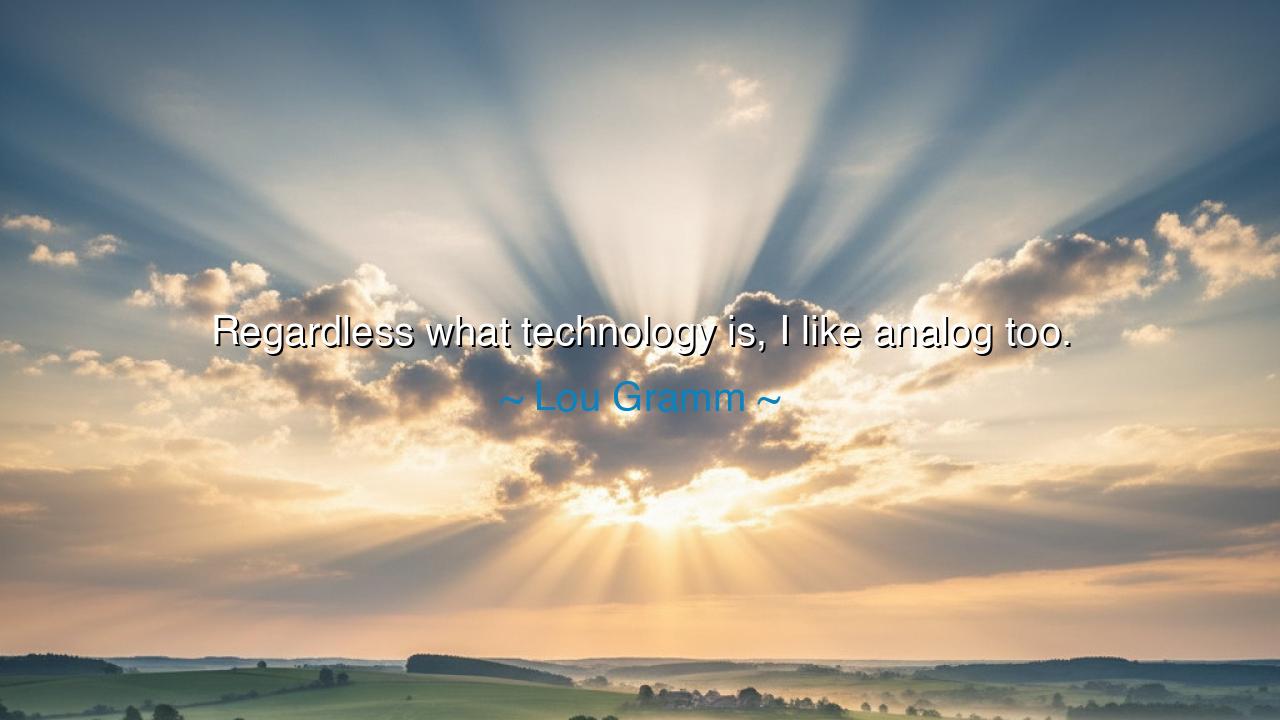
Regardless what technology is, I like analog too.






Lou Gramm, voice of passion and grit, once declared with simplicity yet depth: “Regardless what technology is, I like analog too.” In these words, he affirms a truth that resounds beyond music: that while the march of technology reshapes our lives, there remains an enduring beauty in the analog, in the raw, the imperfect, the human. He speaks of a balance between progress and tradition, between the sleek precision of the digital and the warm authenticity of the tangible.
The origin of this reflection is tied to Gramm’s journey as a legendary rock vocalist, rising to fame with the band Foreigner. He witnessed firsthand the evolution of music from vinyl to cassette, from compact disc to digital streaming. Each innovation promised sharper sound, greater reach, and cleaner production. Yet even amidst these revolutions, Gramm held a love for the analog sound—that crackle of a vinyl record, the warmth of tape, the imperfection that made music feel alive. His words are not nostalgia, but reverence for the human soul that lingers in the analog medium.
History bears witness to this tension between the new and the old. When Johannes Gutenberg introduced the printing press, many lamented the loss of handwritten manuscripts, with their artistry, personality, and individuality. Though the press democratized knowledge, something unique in the illuminated manuscript was lost. Yet both forms carried their own power. So too, in the age of digital sound, the analog retains its sacred quality: it reminds us that perfection is not the same as authenticity.
Gramm’s words also reflect the human longing for touch and presence. The digital world is efficient, but often sterile; the analog world is flawed, but intimate. To hold a vinyl record, to feel the grooves beneath your fingertips, to watch a cassette spin, is to connect with music not as mere sound, but as artifact. It is a reminder that art is not only about the notes played, but about the experience of receiving them with all the senses. Technology may quicken delivery, but the analog deepens meaning.
There is also humility in his statement. For while many chase after the newest tools, Gramm recognizes that the old ways still hold value. This humility is a kind of wisdom, teaching us not to discard what is proven simply because the new has arrived. In life as in music, balance must be sought: to embrace innovation without despising tradition, to honor the warmth of the past while welcoming the clarity of the future.
The lesson is this: not all progress replaces what came before—it often coexists. Just as we read ancient scrolls alongside modern texts, and admire paintings while streaming films, so too can analog and digital share space in our lives. Do not let the pursuit of efficiency rob you of texture. Do not let perfection strip away humanity. Cherish the warmth of the analog even as you benefit from the speed of the digital.
Practical wisdom flows from this teaching. Listen to vinyl records and notice the imperfections that make the sound alive. Write with pen and paper, even as you type on keyboards. Sit face to face with loved ones, even as you connect through screens. In choosing analog moments, you preserve connection, warmth, and presence. These practices will anchor you in a world that is otherwise rushing toward abstraction.
Thus, let Lou Gramm’s words be passed down as counsel for the generations: embrace technology, but do not abandon the analog soul. For in the warmth of imperfection, in the texture of the tangible, in the human touch that no machine can replicate, lies a reminder of who we are. Progress must serve humanity, not erase it, and only in this balance can we walk forward without losing our song.






AAdministratorAdministrator
Welcome, honored guests. Please leave a comment, we will respond soon